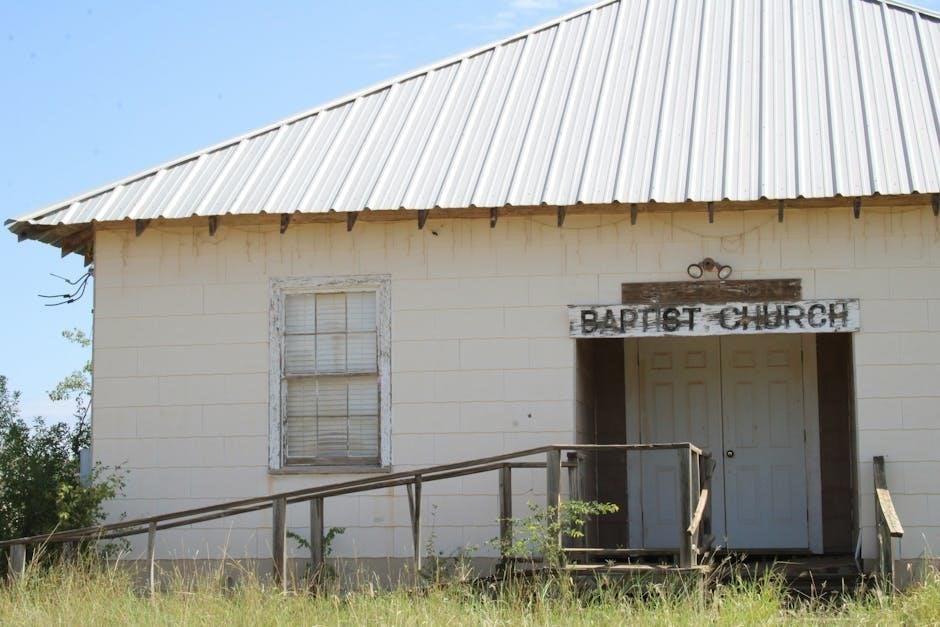baptist manual
Explore the essential Baptist Manual for in-depth teachings, guiding principles, and spiritual growth. Your journey starts here!
The Baptist Manual is a foundational guide providing insights into Baptist beliefs, practices, and history, serving as an essential resource for understanding the faith and fostering spiritual growth․
Overview of the Baptist Faith
The Baptist faith is a Christian denomination emphasizing believer’s baptism by immersion, the authority of Scripture, and individual spiritual responsibility․ Baptists advocate for religious freedom and the priesthood of all believers, believing every Christian has direct access to God․ The faith is rooted in evangelical theology, focusing on personal conversion and a commitment to discipleship․ Baptist churches are typically structured congregationally, with local autonomy and decision-making․ The role of pastors and deacons is central to church governance, promoting unity and spiritual growth․ Baptists are also known for their strong emphasis on missions and evangelism, striving to share the Gospel globally․ This overview highlights the core values and practices that define the Baptist faith and its impact on Christian communities worldwide․
Purpose and Structure of the Baptist Manual
The Baptist Manual serves as a comprehensive guide to Baptist beliefs, practices, and governance, designed to educate and unify believers․ Its purpose is to provide clarity on core doctrines, such as baptism by immersion and the authority of Scripture, while offering practical insights for church operations․ Structured into thematic sections, the manual covers historical roots, theological foundations, worship practices, and community engagement․ It also addresses leadership roles, discipleship methods, and the importance of missions․ Written for both new and seasoned believers, the manual fosters spiritual growth and equips individuals for effective ministry․ Its clear organization ensures accessibility, making it an invaluable resource for understanding and applying Baptist principles in daily life and church leadership․

Historical Background of Baptists
The Baptist movement emerged during the Protestant Reformation, emphasizing believer’s baptism by immersion and congregational governance, originating in 17th-century England and spreading globally as a vibrant evangelical tradition․
Origins of the Baptist Movement
The Baptist movement traces its origins to the early 17th century in England during the Protestant Reformation․ It emerged as a distinct evangelical tradition, emphasizing believer’s baptism by immersion and religious liberty․ John Smyth and Thomas Helwys, key figures, founded the first Baptist church in Amsterdam around 1609, influencing the movement’s early development․ The movement spread rapidly, particularly in America, where it flourished as a prominent Christian denomination․ Baptists emphasized personal faith, congregational governance, and separation of church and state, shaping their identity and practices․ This foundational period laid the groundwork for the Baptist faith, which continues to thrive globally as a vibrant expression of Christianity․
Key Historical Figures in Baptist History
The Baptist movement has been shaped by influential leaders who upheld its core beliefs and practices․ John Smyth and Thomas Helwys are often regarded as founders, advocating for believer’s baptism and religious freedom․ Roger Williams, a champion of liberty, established the first Baptist church in America․ Charles Spurgeon, a renowned preacher, revitalized Baptists in 19th-century England, while Martin Luther King Jr․ exemplified Baptist faith through civil rights activism․ These figures, along with missionaries like Lottie Moon, have profoundly impacted the global spread of Baptist teachings․ Their contributions continue to inspire modern Baptists, emphasizing faith, service, and the pursuit of justice․ Their legacies remain central to Baptist identity and mission․

Core Beliefs of Baptists
Baptists emphasize the authority of Scripture, believer’s baptism by immersion, and the priesthood of all believers, fostering a personal relationship with Christ and congregational autonomy․
The Authority of Scripture
The Baptist Manual underscores the authority of Scripture as the inspired Word of God, serving as the final authority in all matters of faith and conduct․ Baptists believe the Bible is inerrant and sufficient, guiding spiritual truths, moral principles, and church practices․ Scripture is central to worship, discipleship, and decision-making, emphasizing its role in transforming lives and sustaining believers․ This belief fosters a deep commitment to biblical teaching and application, shaping the Baptist identity and mission․
Baptism by Immersion
Baptism by immersion is a central practice in Baptist tradition, symbolizing a believer’s faith and obedience to Christ․ It represents the death, burial, and resurrection of Jesus, as well as the believer’s spiritual rebirth․ Baptists advocate for immersion as the biblical method, reflecting New Testament examples․ This act is viewed as a public declaration of faith and a step of obedience following salvation․ It is not seen as a means of salvation but as a powerful expression of commitment to Jesus Christ and identification with His followers․ The practice emphasizes the importance of personal decision and conscious surrender to God’s will․
The Priesthood of All Believers
The Priesthood of All Believers is a cornerstone Baptist doctrine, emphasizing that every Christian has direct access to God through Jesus Christ, without the need for intermediaries․ Rooted in biblical teachings such as 1 Peter 2:9, this belief underscores the equality of all believers and their shared spiritual authority․ It rejects hierarchical structures, advocating instead for a community where every member participates in worship, leadership, and decision-making․ This principle fosters a dynamic where believers are empowered to minister to one another and serve as ambassadors of Christ․ It reflects the Baptist commitment to individual spiritual responsibility and the belief that all Christians are called to live as priests in their daily lives․

Baptist Practices and Rituals
Baptist practices include baptism by immersion, the Lord’s Supper, prayer, and fasting, emphasizing community worship and personal devotion to foster spiritual growth and fellowship among believers․
Worship Services and Their Significance
Baptist worship services are central to congregational life, fostering fellowship and spiritual growth through collective prayer, hymns, and sermons rooted in Scripture․ These gatherings emphasize the importance of communal praise and reflection, providing a space for believers to connect with God and one another․ Worship services often include testimonies, scripture readings, and the sharing of personal faith experiences, reinforcing Baptist values of community and individual devotion․ Music plays a key role, with hymns and contemporary songs expressing joy, gratitude, and reverence․ The sermon, typically delivered by a pastor, interprets biblical teachings, guiding believers in applying faith to daily life․ Worship services strengthen believers’ relationships with God and their commitment to living out their faith in accordance with Baptist principles;
The Lord’s Supper in Baptist Tradition
The Lord’s Supper, also known as communion, holds profound significance in Baptist tradition as a symbolic remembrance of Christ’s sacrifice․ It involves the use of bread and wine (or grape juice) to represent Christ’s body and blood, embodying His redemptive work․ Baptists observe this ordinance as a memorial, not a sacrament, emphasizing its spiritual and communal nature․ The practice is typically open to all baptized believers who have publicly professed their faith, fostering unity and reflection among participants․ By partaking, Baptists honor Christ’s death and resurrection while reaffirming their commitment to His teachings and the fellowship of the church․ This sacred ritual strengthens believers’ connection to their faith and to one another․
Prayer and Fasting in Baptist Life
Prayer and fasting are integral to Baptist spiritual life, serving as powerful tools for deepening one’s relationship with God․ Prayer is viewed as a direct line of communication with the Divine, fostering intimacy, guidance, and strength․ It is both a personal and corporate practice, often central to worship services and daily devotion․ Fasting, typically accompanied by prayer, is a voluntary act of abstaining from food or other activities to focus on spiritual renewal and seeking God’s will․ Baptists emphasize fasting as a means of humbling oneself before God, preparing for significant decisions, or expressing devotion․ Together, these practices enrich spiritual growth, encourage reliance on God, and nurture a life of faith and obedience․

Church Governance and Structure
Church governance among Baptists emphasizes congregational decision-making, guided by the priesthood of all believers․ Pastors provide spiritual leadership, while deacons support the congregation in practical matters․
Congregational Governance
Congregational governance is a cornerstone of Baptist church structure, emphasizing local church autonomy and collective decision-making․ This model ensures that authority resides with the congregation, guided by scripture and the Holy Spirit․ Members gather in meetings to discuss and vote on key matters, fostering a sense of community and shared responsibility․ This approach reflects the Baptist belief in the priesthood of all believers, where every member has a voice in shaping the church’s direction․ It also aligns with biblical examples of early church practices, where decisions were made collectively․ This system promotes accountability, transparency, and unity, ensuring the church remains true to its mission and values․
The Role of Pastors and Deacons
In Baptist churches, pastors and deacons play vital roles in spiritual leadership and service․ Pastors are responsible for preaching, teaching, and providing spiritual guidance, while deacons assist in practical ministries, such as caring for members’ needs and managing church resources․ Both roles are rooted in biblical principles, with pastors often seen as shepherds of the flock and deacons as servants who support the congregation․ Together, they ensure the church functions effectively, fostering a nurturing environment for spiritual growth․ Their collaborative efforts help maintain unity and order, enabling the church to fulfill its mission and serve the community faithfully․

The Importance of Missions and Evangelism
Missions and evangelism are central to Baptist beliefs, driven by the Great Commission to share the Gospel with all nations, making disciples and addressing human needs globally․
The Great Commission in Baptist Teachings
The Great Commission, found in Matthew 28:18-20, is a cornerstone of Baptist teachings, urging believers to “go and make disciples of all nations․” Baptists emphasize this mandate as a divine call to share the Gospel globally, baptize new believers, and teach them to obey Christ’s commands․ This commission reflects God’s desire for humanity’s salvation and is seen as an urgent responsibility for every Christian․
Baptists interpret the Great Commission as a call to active evangelism and missions, both locally and internationally․ It underscores the importance of discipleship, ensuring that new converts grow in their faith and become fruitful followers of Christ․ The Great Commission motivates Baptists to engage in outreach, planting churches, and addressing spiritual and physical needs worldwide, fulfilling Christ’s command to spread His message to all people․
Global Missions and Their Impact

Global missions are a vital expression of Baptist faith, driven by the belief that the Gospel should be shared with all nations․ Baptists have historically been active in international missionary work, establishing churches, schools, and medical facilities worldwide․ These efforts not only spread the Gospel but also address physical and social needs, demonstrating Christ’s love in action․
The impact of global missions is profound, leading to spiritual transformation, cultural exchange, and community development․ Through missions, Baptists have planted countless churches, disciple believers, and fostered unity among diverse cultures․ These endeavors reflect their commitment to fulfilling the Great Commission and advancing God’s kingdom globally, leaving a lasting legacy of faith and compassion․

Education and Discipleship
Baptist education emphasizes spiritual growth through Bible study, Sunday School, and discipleship programs, fostering a deeper understanding of faith and equipping believers for ministry and service․
Sunday School and Bible Study
Sunday School and Bible Study are cornerstone practices in Baptist education, designed to deepen believers’ understanding of Scripture and foster spiritual growth․ These gatherings provide structured learning environments where individuals of all ages engage with biblical teachings, fostering fellowship and discipleship․ Through systematic study of the Bible, participants gain insights into God’s will, enabling them to apply His Word in daily life․ Sunday School often includes age-appropriate lessons, while Bible Study offers in-depth exploration of specific texts or themes․ Both practices emphasize the importance of community, prayer, and the application of faith, serving as vital tools for equipping believers to live out their faith authentically and effectively in the world․
Discipleship Programs for Spiritual Growth
Discipleship programs within the Baptist tradition are designed to nurture believers in their faith journey, equipping them with biblical knowledge and practical applications for daily living․ These programs emphasize personal spiritual growth, fostering a deeper relationship with Christ and encouraging believers to live out their faith authentically․ Through structured curricula, mentorship, and small-group interactions, participants are guided to maturity in their walk with God․ Discipleship programs also focus on developing leadership skills, empowering individuals to serve within the church and beyond․ By prioritizing accountability and community, these initiatives help believers apply biblical principles, fostering a culture of intentional spiritual development and service to others․

The Role of the Church in the Community
The church serves as a cornerstone for community engagement, offering spiritual guidance, support, and empowerment through outreach programs, food drives, education, and disaster relief efforts․
Community Service and Social Involvement
Baptist churches emphasize the importance of community service and social involvement as a reflection of their faith․ Through outreach programs, food drives, and disaster relief efforts, Baptists actively address local needs, demonstrating compassion and care․ Education initiatives and advocacy for social justice are central to their mission, fostering positive change and empowerment․ By engaging in these activities, Baptists aim to spread the Gospel while improving the well-being of their communities, embodying the teachings of Christ through tangible actions and support․ This commitment to service strengthens both individual faith and collective impact, highlighting the church’s role as a catalyst for transformation and hope․
Evangelism and Outreach Programs
Baptist churches prioritize evangelism and outreach as core ministries, aiming to share the Gospel and fulfill the Great Commission․ Outreach programs often include mission trips, community events, and youth ministries, designed to engage diverse audiences․ These efforts focus on building relationships, addressing spiritual and physical needs, and inviting individuals to faith in Christ․ Evangelism is viewed as a responsibility of all believers, encouraging personal witnessing and discipleship․ Through these programs, Baptists strive to impact their communities and the world, demonstrating God’s love and fostering spiritual growth․ The goal is to create opportunities for people to encounter Christ, ensuring the message of salvation reaches all․

Challenges and Future of the Baptist Church
The Baptist Church faces challenges like declining membership and adapting to cultural changes while remaining true to its theological roots, focusing on revitalization and engaging future generations effectively․
Modern Challenges Facing Baptists
Modern Baptists face challenges such as declining church membership, cultural shifts, and theological debates․ Adapting to societal changes while maintaining doctrinal integrity is a significant struggle․ Many Baptist congregations grapple with attracting younger generations and diverse populations, leading to concerns about long-term sustainability․ Additionally, internal conflicts over issues like social justice and biblical interpretation create divisions․ The rise of secularism and competing worldviews further complicate evangelistic efforts․ Financial pressures and the need for innovative ministry approaches also pose challenges․ Despite these obstacles, Baptists are called to remain faithful to their core beliefs while seeking creative ways to engage their communities and foster spiritual growth in a rapidly changing world․
Adapting to Changing Cultural Landscapes
In today’s rapidly evolving world, Baptists are compelled to adapt to shifting cultural landscapes while remaining true to their faith․ Embracing technology and social media has become essential for reaching younger audiences and maintaining relevance․Additionally, fostering inclusivity and engaging with diverse communities helps bridge gaps and reflects Christ’s love universally․Baptists are also encouraged to address societal issues, such as social justice and environmental stewardship, aligning their actions with biblical teachings․Balancing tradition with contemporary needs ensures the Baptist message remains impactful․Yet, this adaptation requires careful discernment to avoid compromising core beliefs․Discipleship programs and community outreach are vital tools for nurturing spiritual growth in a changing world․Thus, Baptists must prayerfully navigate these challenges, trusting in God’s guidance to remain effective witnesses in an ever-changing society․
The Baptist Manual concludes by summarizing key principles, reinforcing the importance of faith, service, and community, and encouraging believers to apply these teachings in their daily lives․
Summarizing Key Principles of the Baptist Manual
The Baptist Manual emphasizes core beliefs such as the authority of Scripture, baptism by immersion, and the priesthood of all believers․ It outlines practices like the Lord’s Supper and worship, highlighting their spiritual significance․ The manual also explores Baptist governance, stressing congregational decision-making and the roles of pastors and deacons․ Missions and evangelism are central, urging believers to fulfill the Great Commission․ Education through Sunday schools and discipleship programs is encouraged for spiritual growth․ Community service and outreach are vital, reflecting Baptists’ commitment to serving others․ The manual concludes by addressing modern challenges, encouraging adaptation while staying true to foundational principles, ensuring the Baptist faith remains relevant and impactful in a changing world․
Encouragement for Further Study and Application
The Baptist Manual invites believers to deepen their faith through continuous study and practical application of its teachings․ By exploring Scripture, engaging in worship, and participating in community service, individuals can cultivate a stronger spiritual foundation․ The manual encourages believers to embrace discipleship opportunities, fostering personal and collective growth․ It also emphasizes the importance of missions and evangelism, urging believers to share the Gospel with others․ Through prayer, reflection, and active involvement in church life, Baptists are inspired to live out their faith authentically․ The manual serves as a guide for both new and seasoned believers, offering timeless principles to navigate life’s challenges and fulfill their calling in Christ․

